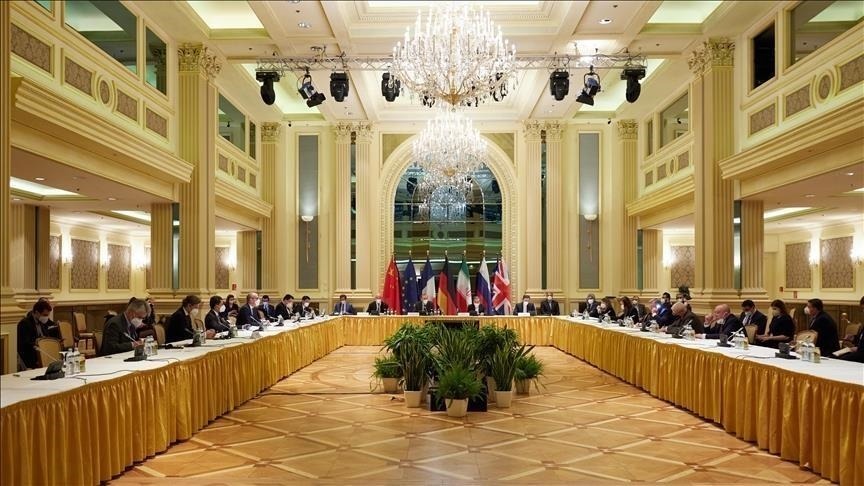New IAEA report notes uptick in Iran’s nuclear enrichment, Tehran calls it ‘politically-motivated’.
TEHRAN (AA) – Conflict is brewing between Iran and the UN nuclear watchdog over monitoring of the country’s nuclear program ahead of the resumption of nuclear deal talks in Vienna.
A new International Atomic Energy Agency (IAEA) report that notes a significant increase in Iran’s stockpile of highly enriched uranium has been met with skepticism in Tehran.
Iran’s acting representative to the Vienna-based UN nuclear agency, dismissing the IAEA report, has called on the agency member states to “not issue hasty or politically-motivated statements” on Iran’s cooperation with the UN nuclear agency.
Mohammad Reza Ghaebi late on Wednesday, in response to the report released the same day, said cooperation between the two sides will continue “despite differences on technical issues,” without elaborating.
He said Tehran has already notified the agency of its move to enrich uranium up to 60% purity, beyond the limit stipulated in the 2015 nuclear deal signed between Iran and the world powers.
The IAEA report quotes the agency chief Rafael Grossi as expressing “deep concern” over the presence of nuclear material in “three undisclosed locations” in Iran, which it says are not known to the agency.
It says Tehran continues to stonewall its investigation into the country’s undeclared nuclear activities, and that it “has not cooperated” on the detection of uranium particles at “three undeclared sites” or responded to issues of “the use of nuclear material” at a fourth site.
The report further says the agency inspectors were “physically harassed” upon entering Iranian nuclear facilities, adding that such security procedures “violate” agreement on the IAEA’s “privileges and immunities,” to which Iran is a party.
– New developments
The IAEA report then details new developments at four sites of concern, including “no interactions between the agency and Iran” at the Turquz-Abad warehouse and the Tehran nuclear plant, fueling concerns about safeguards issues at these sites; seeking information from Tehran about “the possible presence” of natural uranium at the Lavizan-Shian site; and noting that Iran has “yet to provide an explanation” for the presence of anthropogenic uranium particles at the Marivan site.
At the Karaj nuclear site, which was hit by a sabotage attack in June that Iran blamed on Israel, the report says the agency has “not been able to install replacement cameras at the workshop and/or to verify whether the production of centrifuge rotor tubes and bellows has resumed therein.”
Interestingly, the quarterly report comes days ahead of the IAEA board of governors meet from November 24 to 26, fueling speculation that an anti-Iran resolution could be considered at the meeting.
Grossi hinted during his October visit to the US that censuring Iran at the forthcoming board meeting in Vienna was a possibility.
However, what can possibly prevent that is the IAEA chief’s visit to Tehran next week, during which he is expected to hold talks with Iran’s Foreign Minister Hossein Amir-Abdollahian and nuclear agency chief Mohammad Eslami.
– Vienna talks
The next round of nuclear talks in Vienna, scheduled for Nov. 29, has also been overshadowed by the IAEA’s new report, which experts say could give the US and Europe leverage to put pressure on Iran.
Iran, which has taken a slew of measures to scale back its commitments under the 2015 nuclear deal since May 2019, a year after the US withdrawal from the deal, including ramping up its nuclear enrichment activities, has conditionally reversed those measures on the US lifting sanctions on Iran.
On the other hand, the US and its European allies have urged Iran to return to the negotiating table and to fully comply with the nuclear deal.
Addressing the UN General Assembly session on Wednesday, Iran’s envoy to the UN, Majid Takht-Ravanchi, alleged that the US withdrawal from the nuclear deal, re-imposition of sanctions, and non-compliance with the UN Security Council Resolution 2231 led to the stalemate.
He expressed Iran’s readiness to return to full compliance with the deal provided the US lifts sanctions and guarantees that it will “not violate its obligations again.”
The envoy further stated that Iran’s cooperation with the IAEA will continue unhindered and that there is “no issue” with implementing the safeguards agreements.
He went on to condemn the alleged Israeli attacks on Iran’s nuclear facilities and the assassination of Iranian nuclear scientists, including Mohsen Fakhrizadeh, whose first death anniversary is next week.
He said Israel has refused membership of the Non-Proliferation Treaty (NPT), urging the UN nuclear watchdog to “deal with the issue without any political bias.”

